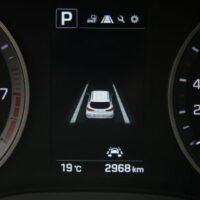Driver Assistance Technologies

Technology has come a long way in the past few decades. It has even revolutionized the auto industry, pretty much turning vehicles into computers. This has allowed for many options to help motorists drive safely.
Since most car accidents are caused by human error, driver assistance technologies are huge game-changers. They make driving safer and more convenient by using a combination of sensors, cameras, radar, and software to assist drivers in various ways.
Driver assistance technologies have the potential to reduce crashes and save thousands of lives every year. Here’s a look at some of the technologies found in newer vehicles.
Forward Collision Warning
This system monitors the vehicle’s speed and the speed of the vehicle in front of it while assessing the distance between the vehicles. If the vehicle gets too close to the vehicle ahead, the system will warn the driver. Keep in mind that forward collision warning systems do not take action to avoid a crash; they merely provide a warning.
Automatic Emergency Braking
Automatic emergency braking systems, on the other hand, do take action to avoid a crash. They apply the vehicle’s brakes automatically to avoid a forward crash with another vehicle. Dynamic brake support and crash imminent braking are systems that potentially save lives and reduce moderate rear-end crashes.
Lane Departure Warning
A lane departure warning system looks at lane markings and alerts the driver when the vehicle is outside of these markings and drifting out of the lane. Note that this system does not take action to avoid a crash and simply provides a warning to the driver.
Lane Keeping Assist
This system, on the other hand, does take action when a vehicle drifts out of its lane. It will generally steer the vehicle back into its lane if it begins to drift.
Blind Spot Warning
Blind spot warning systems look for vehicles in adjacent lanes that the driver may not see when changing lanes. The system will alert drivers to any vehicles with an audio or visual warning.
Rear Cross Traffic Warning
Rear cross traffic warning alerts the driver of potential collisions, while in reverse, that may be outside the view of the backup camera.
Parking Assistance
Not good at parallel parking? That’s OK. Some vehicles come with parking assistance. They may have parking sensors that detect nearby obstacles during parking. To make things even easier, some have automatic parking, which does all the hard work for you by steering and maneuvering the vehicle into a parking space
Adaptive Cruise Control
This technology maintains a set speed but adjusts it to keep a safe distance from the vehicle ahead.
Contact a Personal Injury Lawyer
While driver assistance technologies can be a great help when driving, you still need to know how to drive safely. You should not rely on them fully while on the road.
In a crash? Get legal assistance from a Houston car accident attorney from The West Law Office, PLLC. Our entire legal practice is devoted to representing injured victims and their loved ones. Schedule a consultation by filling out the online form or calling (281) 347-3247.
Source:
nhtsa.gov/vehicle-safety/driver-assistance-technologies#:~:text=Forward%20collision%20warning%20systems%20use,to%20prevent%20a%20potential%20crash.
